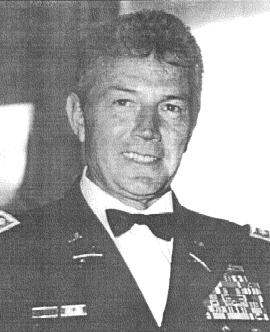Richard J. Meadows facts for kids
Quick facts for kids
Richard J. Meadows
|
|
|---|---|
 |
|
| Nickname(s) | "Dick" |
| Born | June 16, 1931 Johnson Creek, Alleghany County, Virginia, U.S. |
| Died | July 29, 1995 (aged 64) Ft. Walton Beach, Florida, U.S. |
| Buried |
Ft. Walton Beach, Florida, U.S.
|
| Allegiance | United States |
| Service/ |
United States Army |
| Years of service | 1947–1977 |
| Rank | Major |
| Unit | 75th Ranger Regiment United States Army Special Forces Special Air Service MACV-SOG |
| Battles/wars | Korean War Vietnam War Operation Ivory Coast Operation Eagle Claw |
| Awards | Distinguished Service Cross Silver Stars (2) Bronze Star with V Device Air Medal Legion of Merit Combat Infantryman Badge Master Parachutist badge Ranger Tab Scuba Badge |
Richard James Meadows (June 16, 1931 – July 29, 1995) was a brave officer in the U.S. Army Special Forces. He fought in the Korean and Vietnam wars. He was also very important in the Iran Hostage Rescue mission in 1980. Many people see him as a key person in shaping the modern U.S. Army Special Forces.
Contents
Richard Meadows' Military Career
Richard Meadows joined the Army in 1946 when he was just 15 years old. He first experienced combat as a paratrooper in the Korean War. By the time he was 20, he became the youngest Master Sergeant in the Army. In 1953, he joined the U.S. Army Special Forces. He served with them or the Rangers until he retired in 1977. Even after retiring, he played a big part in the Iran Hostage Rescue mission.
How Meadows Helped Shape Special Forces
In 1960, Meadows was one of the first U.S. Army officers to train with the British Special Air Service (SAS). The SAS is a very famous special forces unit. Meadows completed their tough training. He even led a troop for a year and went on a combat mission with them. His experience with the SAS likely helped create the training and organization for future U.S. Army Special Forces.
Meadows in the Vietnam War
While serving in Panama, Master Sergeant Meadows volunteered to go to Vietnam. He joined a secret unit called the Military Assistance Command, Vietnam - Studies and Observations Group (MACV-SOG). Here, he went on many deep missions into enemy territory in Laos and North Vietnam.
During one mission, he filmed North Vietnamese soldiers moving through South Vietnam. This proved that the North Vietnamese government was not telling the truth. On another mission, he made enemy artillery guns useless by taking off their sights. He even gave one of these sights to General William Westmoreland. General Westmoreland was so impressed that he promoted Meadows to Captain in 1967.
In 1970, Captain Meadows was chosen to lead a team for a daring raid. This was the Son Tay prison camp raid, also known as Operation Ivory Coast. His 14-man team, called Blueboy, intentionally crashed a helicopter right into the prison camp. This was to surprise the enemy as much as possible. One team member was hurt in the landing, but the rest completed their mission safely. Sadly, the prisoners had been moved weeks before the raid.
In the mid-1970s, Meadows was very important in starting the Delta Force. This is a special operations unit that focuses on hostage rescue. Meadows retired from the Army as a Major in 1977, after 31 years of service.
Life After the Army
In 1980, Meadows returned to help the government. He pretended to be an Irish businessman. He secretly gathered information about the U.S. Embassy in Tehran before and during Operation Eagle Claw. This mission was to rescue American hostages in Iran. Meadows' job was to scout the embassy, find the hostages, and rent trucks for the rescuers.
The mission had a big accident in the Iranian desert and was stopped. Even though secret documents were found, Meadows managed to escape Iran on a regular flight. His secret identity was still safe. In 1982, Meadows was featured on the cover of Newsweek magazine.
Richard Meadows passed away in 1995 from leukemia. Many in the Special Forces community believe he should have received the Medal of Honor. However, many of his secret roles with the CIA's Special Activities Division in Vietnam are still not known to the public.
Awards and Honors
Major Meadows received many military awards and decorations for his bravery and service.
|
|
||||||||||||||||||||||||||||||||||||||||||||||||||||||||||||||||||||||||||
Meadows also received many awards from other countries. After he retired, he was eligible for the Korean War Service Medal from South Korea and the Special Forces Tab. Just before he died in July 1995, he was told he would receive the Presidential Citizens Medal from President Clinton.
Meadows' Lasting Legacy
On June 6, 1997, a statue and a parade field were dedicated to Richard Meadows. They are located near the U.S. Army Special Operations Command building in Fort Bragg, North Carolina. This shows how important he was to the Special Forces.
Images for kids








